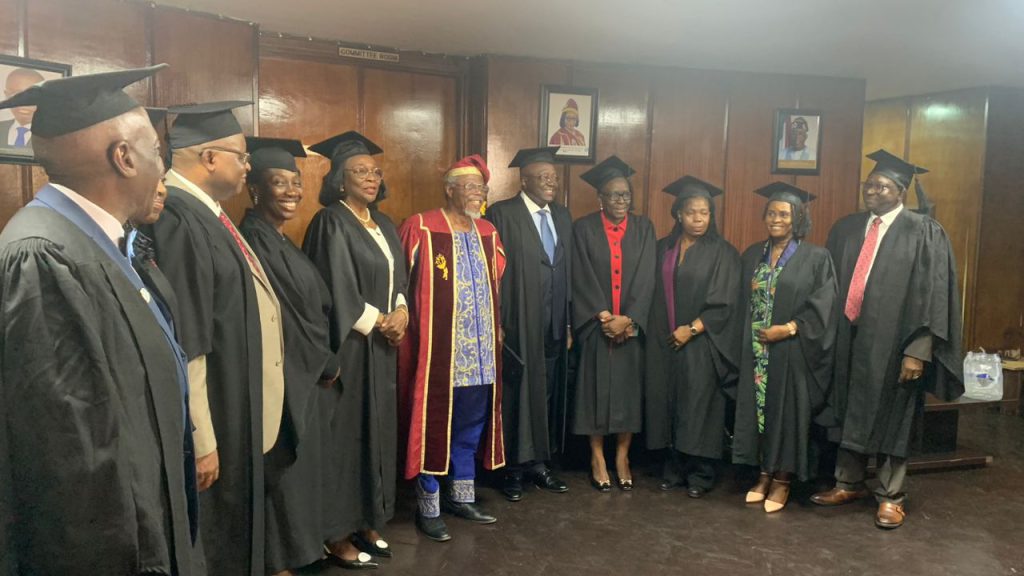Toyin Falola, a professor of History, University of Texas, Austin, U.S. on Monday said that indigenous practices and beliefs should be exposed to scientific investigations in Nigeria’s education curriculum, rather than being dismissed.
He stated this while delivering the 54th convocation lecture of the University of Lagos, with the theme, ‘Decolonising African Higher Education for Transformational Development”.
He cited such practises and beliefs that should be given such exposure as those related to natural phenomena like medicine and politics.

He maintained that indigenous knowledge systems had distinct and essential roles to play in educational curriculum.
According to him, integration of these into educational programmes enhances the inclusivity of the curriculum.
He said it would also mitigate the sense of alienation experienced by diverse minority students in African institutions of higher learning.
The professor noted that instructors at all levels should consider involving students in scientific investigations aimed at comprehending or disproving the underlying meanings to these taboos.
“It encourages students to engage actively with their cultural heritage, while also developing their scientific inquiry abilities. Lecturers in institutions of higher learning in Africa, must strive to take on the role of champions for the interpretation of indigenous knowledge and wisdom. They must work to upgrade and enrich these traditional bodies of knowledge through ongoing research and scholarly engagement.

He said that a successful approach must promote critical thinking and bridge the gap between traditional wisdom and scientific understanding
“This not only preserves cultural heritage, but also ensures that indigenous knowledge evolves and adapts to contemporary challenges and opportunities. By doing so, education in Africa can be a bridge between the past and the future, nurturing a generation of well-rounded, culturally connected and scientifically literate individuals,” he said.
According to him, over the years, African scholars have made substantial contributions to the discourse on politics, offering informative perspectives that were culturally inclusive.
He, however, noted that sadly, the field of political studies within the African higher education system tended to heavily favour the political theories of western scholars.
Falola argued that sometimes, this development disregards the conscious efforts of African political actors and scholars, noting that this inclination often sidelines the significance of tailoring political thought to the African context and terrain.
“Given these considerations therefore, the best teaching method for African higher institutions will ideally be a balanced and inclusive approach. This approach should involve the incorporation of both the western and indigenous knowledge systems, providing students with a comprehensive education that is deeply rooted in their own cultural and historical context, while also drawing from the wealth of global knowledge,” he stated.
He noted that a way forward was to demand for the concept and research of these higher institutions to reflect African scholarship.
According to him, the fundamental ideas and the systemic investigations in African higher education must embody the epistemologies and methodologies of African scholarship and the promotion of Afrocentric research methodologies.
He noted that the university education in Nigeria has the potential to generate a lot of income, from donations to investments, as well as a large pool of internally generated revenue (IGR).
Falola identified among other ways of repositioning higher institutions in Africa, combined honours award in African culture, science and economies.
He said that an interdisciplinary combined honours programme in these fields would generally strengthen efforts toward decolonisation of African universities.
According to him, this will evolve an approach to education that allows students to explore and integrate knowledge from the academic discipline of culture, science and economics.
He also explained that the creation of the Department of Lagoon and Sea Economies, among others, was another way out to the decolonisation of African universities.
“Education at the University of Lagos for instance must involve research and understudies that explore subjects and concepts that will foster the country’s infrastructural and economic development.
“A recommended project for the institution will be the creation of the Department of Lagoon and Sea Economies, possibly under the Faculty of Engineering or like in other institutions, under the Faculty of Marine and Maritime Engineering and Economies,” he said.
He however noted that pecuniary and fiscal shortages pose significant threats to the advancement of these recommendations.
According to him, undertaking such projects would require extensive funding. He noted that the previous demand by the Federal Government for a 40 percent of the IGR was unnecessary.
The don explained that the high percentage for IGR from public universities in Nigeria would ultimately lead to an increase in tuition fees.
“This will create a situation like the recent protests by students of UNILAG against the increase in their tuition, a situation exacerbated by the country’s nosediving economy,” he said.
(NAN)

